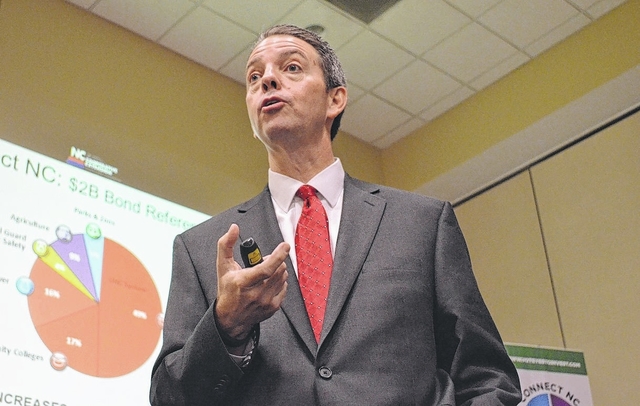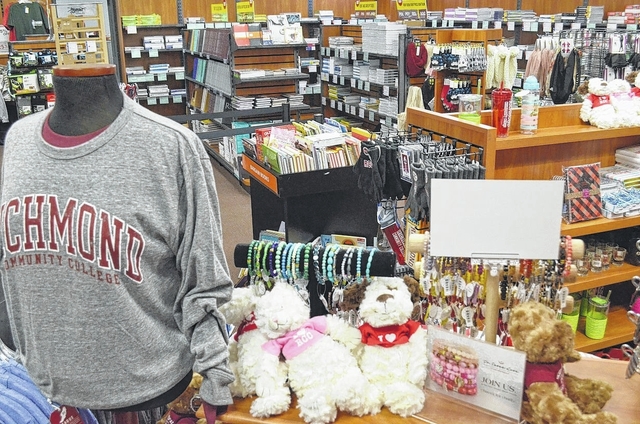HAMLET — Richmond Community College stands to receive a $7.22 million allocation for new construction and renovations if North Carolina voters OK the $2 billion Connect N.C. Bond package at the ballot box in March.
The funds will be used to build and expand classrooms, labs and shops as well as other areas on campus, according to RCC President Dr. Dale McInnis.
He said the college would also expand the bookstore — run by the Illinois-based Follet Corp. — make room for more early college students, create a new student career and transfer center, add a cafeteria, make repairs and additions to the parking lot and increase faculty office space.
McInnis cited growth in enrollment — especially for high school and early college students — as the need for the investment, saying the college “has reached a plateau due to space after rapid growth.”
With the new additions, he said the college would be able to offer more course options and programs and allow for the expected enrollment growth from the Richmond CC Guarantee program.
According to the college’s website, the program “will guarantee free college tuition and fees to RCC for two years for all Richmond and Scotland County residents who graduate from high school with two or more RCC dual enrollment courses with a grade-point average of 3.0 or higher and who complete financial aid applications.”
McInnis said the bond was beneficial for the college, students and the county as a whole.
SPREADING THE WORD
Making their way across the state to spread awareness of the Connect N.C. Bond package, officials from the N.C. Cooperative Extension and N.C. State University stopped at Cole Auditorium on Thursday for a training session.
Dr. Marshall Stewart, from NCSU’s College of Agriculture and Life Sciences, said the Richmond County presentation was the 20th since last Monday and that the plan had been “positively received.”
Placed around each table were materials to promote the bond.
One document showed the distribution of projects by category and county and listed how much money would be allocated to each one.
The University of North Carolina System will receive the bulk of the funding — $980 million, which accounts for 49 percent of the entire package — for new buildings, mostly in the science and engineering fields.
“In (agriculture), this is a very big deal for this state,” Stewart said, adding that the bond is one of the single-largest investments in agriculture in the state’s history. “It’ll benefit all of us. This is a way to take a giant leap for North Carolina.”
UNC Pembroke is slated for $23 million for a new business school.
The state’s community colleges will receive the second-largest piece of the bond package pie, $350 million. Like RCC, the community colleges will use the money for new construction and bringing older buildings up to code.
Nearly the same amount percentage-wise, $312.5 million, will be used to upgrade local parks and provide statewide grants and loans for water and sewer projects.
The remaining funds will be divvied up between the National Guard and public safety, agriculture — including an $85 million plant sciences building at NCSU — and state parks and attractions.
Proponents of the bond say there will be no new taxes or tax increases, which Stewart called “a great selling point.”
Matthew Hebb, field director for the Connect N.C. committee, said the state has decreased its existing debt service and interest rates are at record lows.
“All of these things have come together as ingredients as to why we won’t have a tax increase,” he said.
“We can do (these projects) now or later,” he added, saying the state should take advantage of the interest rates.
Richard Campbell, chief communications officer for the College of Agriculture and Life Sciences at NCSU, said that while there is some opposition to the bond, the two biggest obstacles are apathy and a lack of awareness.
“Online is how people will find out about it,” he said, pointing out the different ways to spread information using social media.
Other materials given to attendees of the meeting contained sample speeches and op-ed pieces to send to local news publications.
BIPARTISAN SUPPORT
Gov. Pat McCrory pitched the idea last spring, which was originally a $3 billion plan that included transportation projects.
Sen. Tom McInnis, R-Richmond, was originally against the $1.5 billion in transportation, saying there was no need to do that when legislators stopped the “immoral” transfer from the highway fund to the general fund.
He said he gave it the go-ahead when it was “pared down to where the rubber meets the highway,” calling the community college system and rural North Carolina the state’s backbone to economic development.
“There aren’t many bipartisan things that happen in the General Assembly,” said Rep. Ken Goodman, D-Richmond, chairman of the Main Street Democrats Legislative Caucus. “But this is one.”
The bond bill overwhelmingly passed the Senate 41-2 on Sept. 24, with one senator not voting and six being absent, including Sen. Phil Berger, president pro-tem.
The state House of Representatives passed the measure 93-20 on Sept. 30 and it was signed by the governor on Oct. 21.
Proponents say the bonds will allow the state over a 20 to 25-year period to pay for assets that will last for at least 50 years and “benefit the state for future generations to come.”
“If we’re going to do it,” McInnis said, “we need to do it on things where the life (of the project) is longer than the payment schedule.”
JUST SAY NO
Not everyone in the state is supportive of the referendum.
Rep. Justin Burr, R-Stanly, was one of 20 state House members to vote down the proposal when it jumped its last legislative hurdle in late September. There were also two senators who voted no.
“I had a number or reasons as to why I voted against it,” he said in a telephone interview Thursday afternoon.
“It was a transportation proposal,” Burr continued. “It’s turned into a politician’s Christmas tree where they’re doling out money across the state.”
He said the funding was being used for “feel-good things” and questioned, “Is this how we should go about funding those (projects)?”
Referencing the 2007 state facilities master plan, Burr said there were more pressing renovations that needed to be made at buildings where state employees are working in less-than-favorable conditions.
“I’m not saying community colleges don’t need the help,” he said. “We did not focus on funding our priorities.”
He also said that studies show more university students are taking courses online, dropping enrollment in the classroom.
Are they all needed?” he asked. “I don’t think so.”
Reps. Michael Speciale, R-Craven, and Mark Brody, R-Union, have also been vocal about their opposition.
Conservative activist Nicole Revels is leading the charge among the public, creating the NC Against the Bond page on Facebook. The community page has more than 460 likes from conservative and libertarian supporters.
“Each project should be considered on its own merits during the budget process rather than lumped into an up-or-down omnibus spending vote,” she told the Daily Journal on Thursday. “I question whether the projects that the bond would fund are actually necessary expenditures.”
Revels believes if the projects “truly have merit,” then they should have been prioritized by state legislators during the budget process “rather than borrowing money and leaving future taxpayers with the bill for today’s projects.”
“North Carolina households have to prioritize their finances and legislators should operate in the same way rather than acquiring massive debts to pay for needs and wants,” she said.
Revels also isn’t satisfied with the claim that taxes won’t be increased due to the bond.
“They can say whatever they want about it, but there’s nothing that binds them to those claims, which I consider to be empty promises,” she said. “The $2 billion will have to be paid somehow, whether that happens by a tax increase or by taking money away from other future priorities.”
VOTERS DECIDE
The fate of the Connect N.C. Bond package will be left up to the state’s voters.
The issue will appear on the ballot for the March 15 primary.
Reach reporter William R. Toler at 910-817-2675 and follow him on Twitter @William_r_toler.


